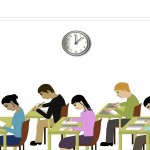 For successful testing, students need to know what will be on the test. Sounds obvious, but parents don’t want to hear from their teens that there were “surprises” on a test or that they studied for the wrong thing.
For successful testing, students need to know what will be on the test. Sounds obvious, but parents don’t want to hear from their teens that there were “surprises” on a test or that they studied for the wrong thing.
This edition of the Successful Assessment will review how to help your teenage student identify what will be on a test.
As outlined in the introductory post, How to approach a test (or why doesn’t my child test well?), at the A+ Club, we help middle, high school and college students succeed on formal assessments, what we usually call “quizzes” and “tests.” Our quick measure of a successful assessment means:
- No Surprises (identified teacher expectations)
- Student Prepared (successful learning)
- Student had time to finish (successful test execution)
No surprises!
“No Surprises” on a test means the student knew what to expect, knew what to study, and was familiar with every part or aspect of the test.
Whether or not the student fully prepared for it is another matter (part 2 of the series will address test prep), but knowing what to expect on a test is the essential start to a successful test outcome.
If there were surprises, either the student wasn’t fully aware of or the teacher did not clarify the expectations. A study guide is only so good as it reflects what will be on the test.
Study Guides
Sometimes teachers put more in the study guide than actually shows up. That’s okay — if the student was prepared and it was on the test, all good, and if it was expected of them to learn it and it did not show up on the test, that’s okay, too. That’s vastly different from studying for the wrong thing – or not even knowing what to study for.
Or, teachers may not provide study guides, or they may even provide study guides that are, shall we say, less than useful. Either way, if there is a study guide it needs to be considered.
Students can also use the study guide in the classroom. It’s a great opportunity to ask the teacher for clarification and to engage in additional preparation for the test. It also puts the teacher on the spot to make sure the test is fair and the study guide is accurate.
Listen to the teacher!
Students frequently miss other cues and clues about what to expect on a test that may not be on a study guide or that are explicitly stated by the teacher.
Teachers frequently tell students informally what will be on a test in class during the days beforehand. A good teacher will be thinking through ahead of time what will be on the test and whether or not the students are prepared for it, and will thus talk about the test the days beforehand to clarify concerns.
Who wrote the test?
Most kids assume the teacher prepared the test. Many do, but most get their test questions and formats from some other resources, usually the textbook.
If so, perhaps studying the textbook would yield better preparation for the test than even your class notes.
Either way, read the textbook!
Even if the teacher doesn’t use the textbook much or if the teacher actually (!) writes the test him or herself, that doesn’t mean the textbook isn’t useful — or even essential for test preparation.
Textbook publishers create very sophisticated products that are designed help both students and teachers. Along with the “teacher edition,” teachers are given an extraordinary amount of additional material to assist in daily lesson and unit planning, graphics and homework for students, and, most importantly, ready-made quizzes and tests.
Even if a teacher does not follow a textbook day to day, it is very common that the teacher is still pulling assessments from the textbook teacher materials.
Students can identify what will be on the test in the textbook. They generally include study guides at the end of every section or chapter that align to the quizzes and tests provided to the teacher. We rarely fail to hear the “aha!” moment from our students who suddenly find that the textbook and not the teacher has been making the test questions all along.
Successful Assessments start with awareness of expectations
The first thing you as a parent can do to ensure your child has the best chance for success on a test is to review teacher, textbook, and curricular expectations. See what your child expects to be on a test and don’t be afraid to reach out to the teacher for clarification.
Parents, good luck to your student on that test – you can help them towards it!
– Michael

One thought on “A Successful Assessment pt 1: how to know what will be on the test (or identifying teacher expectations)”